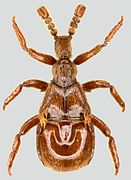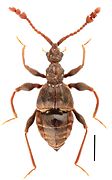Pselaphinae
| Pselaphinae | |
|---|---|

| |
| Ctenisodes sp. | |
| Scientific classification | |
| Kingdom: | Animalia |
| Phylum: | Arthropoda |
| Class: | Insecta |
| Order: | Coleoptera |
| Family: | Staphylinidae |
| Subfamily: | Pselaphinae Latreille, 1802[1] |
Pselaphinae are a subfamily of beetles in the family Staphylinidae, the rove beetles.[2] The group was originally regarded as a separate family named Pselaphidae. Newton and Thayer (1995)[3] placed them in the Omaliine group of the family Staphylinidae based on shared morphological characters.
This is a species-rich subfamily with 9,000 to 10,000 described species.[4] They are especially diverse in the tropics. They are commonly found in decaying leaf litter on forest floors, in grass tussocks, flood refuse, moss, and other highly structured and particulate microhabitats. Little is known about their biology. They are believed to be predatory on small invertebrates, in particular springtails (order Collembola) and oribatid mites (order Oribatida).
Pselaphines have attracted the interest of entomologists due to their exquisite and variable morphology, which is rewarding to observe with a microscope. In addition, the myrmecophilous ("ant-loving") behavior of some pselaphine groups (notably certain batrisites, pselaphites, and clavigerites) has inspired behavioral studies. Spectacular morphology and myrmecophilia are both taken to extremes by the Clavigeritae. These are obligate inquilines which have undergone radical changes in body form, including segmental fusions within the abdomen and antennae to form strong, rigid, plate- and club-like structures, respectively. Clavigerites also possess trichomes, which secrete a solution on which ant larvae feed.
Anatomy[]
Pselaphines are small, compact beetles. The elytra are short, not covering the first abdominal segment. The head and pronotum are narrower than the elytra. Most have clubbed antennae.
Most species have 11 antennomeres, and some have 10, 9, or 3. Most have a tarsal segmentation formula of 3-3-3, and some have 2-2-2.
Systematics[]
The 100 genera in North America contain 710 species.
The Pselaphinae consist of six "supertribes":[5]
Gallery[]
See also[]
References[]
| Wikimedia Commons has media related to Pselaphinae. |
| Wikispecies has information related to Pselaphinae. |
- ^ "Pselaphinae Report". Integrated Taxonomic Information System. Retrieved 2018-11-22.
- ^ Newton, A. F., Jr., M. K. Thayer, J. S. Ashe, and D. S. Chandler. 2001. 22. Staphylinidae Latreille, 1802. p. 272–418. In: R. H. Arnett, Jr., and M. C. Thomas (eds.). American Beetles, Volume 1. CRC Press; Boca Raton, Florida. ix + 443 p.
- ^ Newton, A. F. & M. K. Thayer. 1995. Protopselaphinae new subfamily for Protopselaphus new genus from Malaysia, with a phylogenetic analysis and review of the Omaliine Group of Staphylinidae including Pselaphidae (Coleoptera), pp. 219–320. In: J. Pakaluk and S. A. Slipinski (editors). Biology, phylogeny and classification of Coleoptera: Papers celebrating the 80th birthday of Roy A. Crowson. Muzeum i Instytut Zoologii PAN, Warszawa.
- ^ Newton, A. F. & D. S. Chandler. 1989. World catalog of the genera of Pselaphidae (Coleoptera). Fieldiana: Zoology (N.S.) 53: 1–93.
- ^ Chandler, D. S. 2001. Biology, morphology, and systematics of the ant-like litter beetle genera of Australia (Coleoptera: Staphylinidae: Pselaphinae). Memoirs on Entomology International 15. x + 562 pp.
External links[]
- Pselaphinae. Bugguide.net
- Pselaphinae




